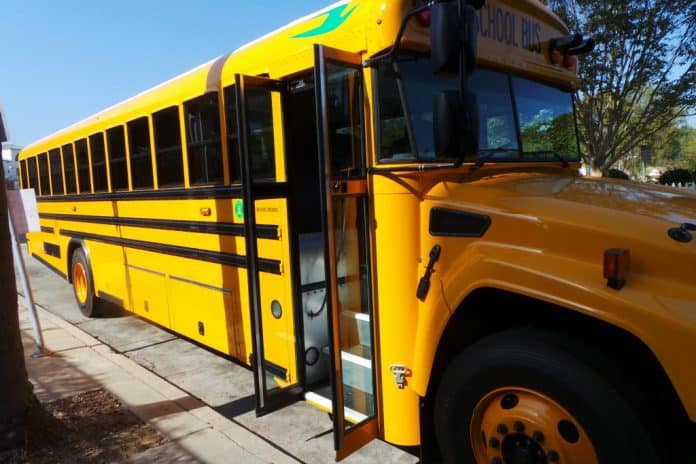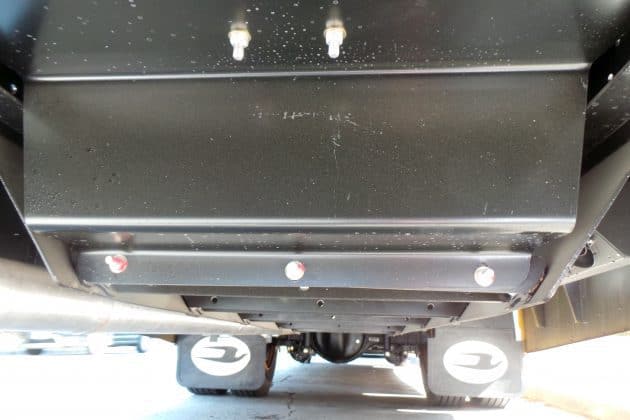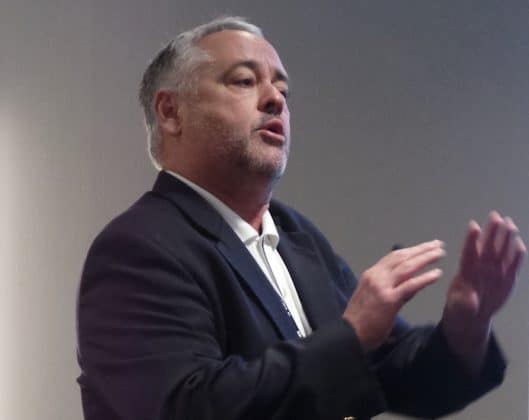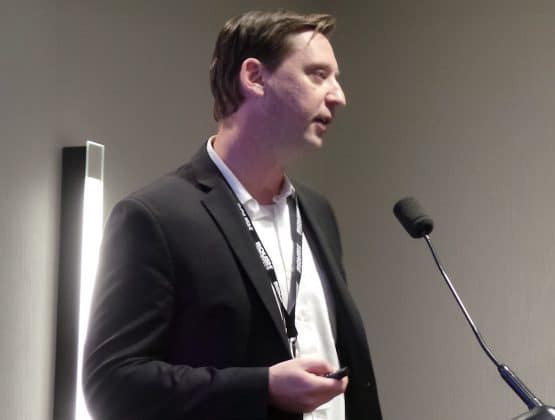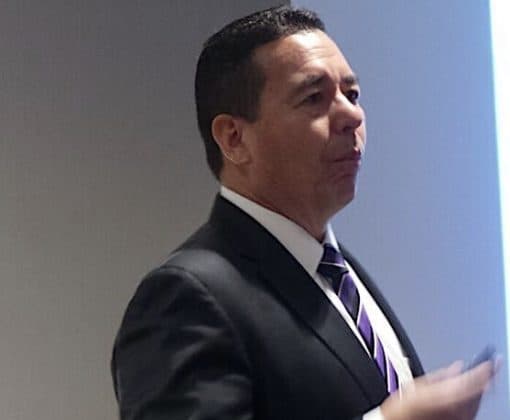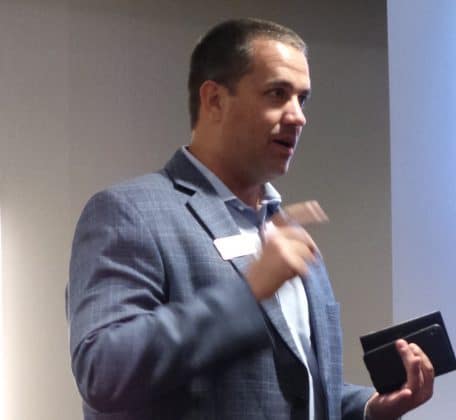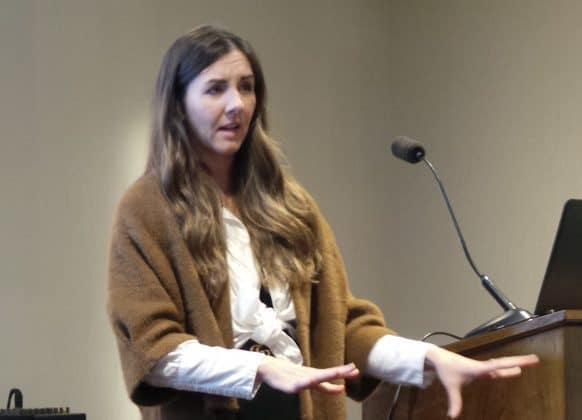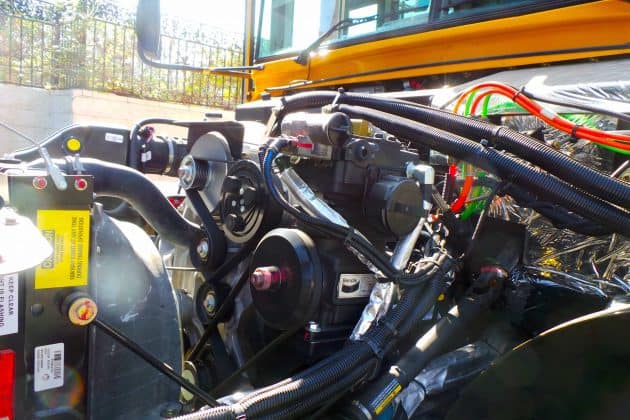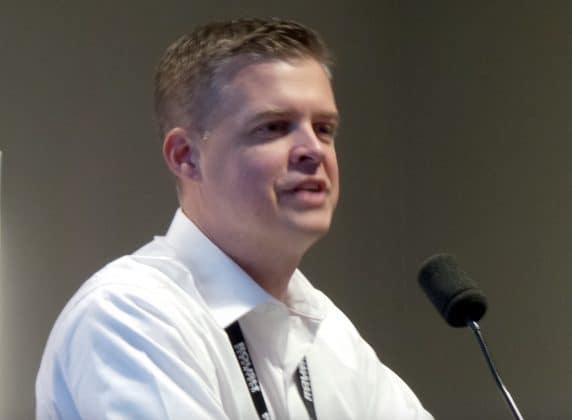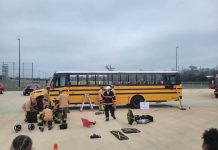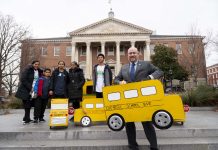ROUSH CleanTech hosted its third of three roadshows this week to showcase its new near-zero-emissions, propane-powered school buses that are now available to school districts. Presentations were highlighted by a plan to increase the California Sales Tax.
Top ROUSH executives and school district officials attended, as well as some government officials, including Joseph K. Lyou, Ph.D., a governor’s appointee member of the South Coast Air Quality Management District (SCAQMD) Governing Board. He is also president and CEO of the Los Angeles-based Coalition for Clean Air, which was founded in 1971.
A ride-and-drive opportunity in Beverly Hills concluded the event. The other similar events were held in Sacramento on Nov. 6, and Fresno on Nov. 7.
After reviewing the potential cost savings that Dr. Lyou said can be obtained by more school districts acquiring alternative fuel buses, such as propane, he said that he wants the SCAQMD to ask the California State Legislature to raise more money for air quality districts.
Lyou said that would happen via an increase in the California Sales Tax, which is already one of the highest in the U.S. The latest round of higher sales tax rates approved by local voters went into effect in six cities on Oct. 1. The highest is in Los Angeles County’s Highland Park, which rose to 10.25 percent from 9.5 percent.
One of his slides during the presentation noted that the “[SC]AQMD’s clean air plan calls for 68,860 new near-zero emission light and medium heavy-duty trucks by 2023, supported by $1 billion of incentive funding.”
Speakers focused on renewable propane, a nonfossil fuel that is produced from 100 percent renewable raw materials, they said, such as cow fat, waste, residue and sustainably produced vegetable oils.
Chelsea Jenkins, ROUSH’s executive director of government relations, stressed that California has up to $3 billion in total grants that are becoming available soon. She noted that propane autogas has been ROUSH’s best-selling product, and that its first Blue Bird bus was delivered in 2012. Now, “90 percent of the buses that Roush delivers are propane powered,” she added.
Through the SCAQMD’s Carl Moyer Program, $150 million is expected to become available in early 2019. The program will provide funds to replace medium- and heavy-duty trucks and buses, which include school buses, transit vehicles, emergency vehicles, utility vehicles, infrastructure and retrofit projects. In addition, low oxides of nitrogen (NOx) vehicle projects will be eligible for up to $100,000 per vehicle, although scrappage of the existing vehicle will be required.
Then, with the EPA’s National Clean Diesel Program, $40 million will also be available early next year to fund the replacement of medium- and heavy-duty trucks and buses. Low NOx propane vehicle projects will be eligible for up to 35 percent of new vehicle costs, with scrappage of existing vehicles required.
Jenkins showed another slide on the EPA’s Targeted Air Shed Grant Program, which is offering $40 million to address NOx and PM2.5 emissions. Eligible states include California, Idaho, Oregon, Pennsylvania and Utah. The grant deadline is Jan. 4 for applicants to request up to $5 million per project.
Jenkins specified that there is a “96 percent NOx reduction with propane versus clean diesel-powered buses,” according to a West Virginia University study published earlier this year. Jenkins added that “propane is the most cost-effective way to reduce NOx emissions.” Jenkins also commented that she is hoping the fuel excise tax credit from Congress, which would yield a rebate of about 38 cents per gallon, will be passed this coming congressional session.
Another slide during her presentation, “The Proof is in the Pudding,” broke down operating costs. She reported an average cost saving per bus in year one of approximately $7,320 with propane autogas ($109,800 for a 15-year lifetime), which averages out to a cost per mile for fuel and maintenance of $0.19, compared to $0.80 for diesel. That is because, she claimed, propane autogas buses are “easier and less expensive to maintain.”
Joe Rudolph, director of business development for ROUSH, noted that there are now over 3,000 public propane filling stations nationwide that can be accessed for 24/7 fueling. [The U.S. Department of Energy’s Vehicle Technologies Office Alternative Fuels Data Center currently places the latest tally for U.S. propane filling stations at 3,081.] The fueling process takes the same amount of time as with gasoline and diesel fueling, he pointed out.
Rudolph commented that he started out as a vehicle mechanic, so he has a long history in the transportation industry. Rudolph also discussed ROUSH’s ongoing work with Ford as a Qualified Vehicle Modifier developer and installer of dedicated propane autogas fuel systems. The QVMs comply with all Ford engineering requirements and develop a vehicle components package.
Ed Dumire, who handles western region sales at ROUSH, reported that Texas now ranks first and California second in propane-powered school bus deployment. He reviewed some of the key features of the Blue Bird propane-powered school bus, such as that special fuel injectors are used to inject liquid propane into the cylinders for ignition. Also in the engine compartment, the Fuel Rail Pressure Control Module ensures consistent vehicle performance and power on demand.
Dumire then reviewed the signature blue anodized aluminum fuel rail that is designed to operate under varying temperatures of liquid propane. In other sections of the bus, the fuel lines are made of high-durability stainless steel, to handle the varying temperatures.
The liquid propane autogas fuel tank meets all ASME certification standards, is manufactured from carbon steel, and is built and assembled in the U.S. For the fueling process, an industry-standard valve is designed to allow for safe passage of liquid propane into the vehicle, including a check valve to prevent fuel leaks—almost exactly like the connectors on backyard barbecues.
The last slide was a map of California school districts that are ROUSH-Blue Bird customers: Anaheim Union High School; Desert Sands Unified School District; Elk Grove Unified School District; Fullerton School District; Inglewood Unified School District; Los Angeles USD; Moreno Valley USD; Plumas USD; Simi Valley USD; and William S. Hart USD.
The next speaker was Patrick Couch, a mechanical engineer and vice president of technical services at Gladstein, Neandross & Associates, who pointed out that propane costs about $1 per gallon before taxes. “Renewable propane will reduce the carbon footprint even further,” he commented. This week the first shipment of renewable propane entered California, he announced to the audience of public organizations and school district officials.
Larry D. Osgood, who handles project optimization and engine development at the Propane Education and Research Council, said there are now over 18,000 total propane-powered school buses nationwide that are on the road. ROUSH is now selling approximately 2,000 Blue Bird school buses per year.
Propane is domestically produced, ROUSH noted, and more than 750 school districts are now operating propane buses.
According to the Propane Education and Research Council, propane fuel tanks are 20 times more puncture resistant than gasoline tanks. Propane autogas, PERC noted, is a nontoxic, noncarcinogenic and noncorrosive fuel.
In addition, it poses no harm to groundwater, surface water or soil. The new quick connect refueling nozzles require only one hand to operate, do not require using protective eyewear or gloves, and the closed fueling connection makes a seal that prevents fuel spills.


